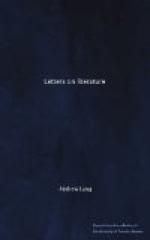* * * * *
A reedy island guards the sacred
bower
And hides it from the meadow, where in peace
The lazy cows wrench many a scented flower,
Robbing the golden market of the bees.
And laden branches float
By banks of myosote;
And scented flag and golden fleur-de-lys
Delay the loitering boat.”
I cannot say how often I have read that poem, and how delightfully it carries the breath of our River through the London smoke. Nor less welcome are the two poems on spring, the “Invitation to the Country,” and the “Reply.” In these, besides their verbal beauty and their charming pictures, is a manly philosophy of Life, which animates Mr. Bridges’s more important pieces—his “Prometheus the Firebringer,” and his “Nero,” a tragedy remarkable for the representation of Nero himself, the luxurious human tiger. From “Prometheus” I make a short extract, to show the quality of Mr. Bridges’s blank verse:
“Nor is there any spirit on
earth astir,
Nor ’neath the airy vault,
nor yet beyond
In any dweller in far-reaching space
Nobler or dearer than the spirit
of man:
That spirit which lives in each
and will not die,
That wooeth beauty, and for all
good things
Urgeth a voice, or still in passion
sigheth,
And where he loveth, draweth the
heart with him.”
Mr. Bridges’s latest book is his “Eros and Psyche” (Bell & Sons, who publish the “Prometheus"). It is the old story very closely followed, and beautifully retold, with a hundred memories of ancient poets: Homer, Dante, Theocritus, as well as of Apuleius.
I have named Mr. Bridges here because his poems are probably all but unknown to readers well acquainted with many other English writers of late days. On them, especially on actual contemporaries or juniors in age, it would be almost impertinent for me to speak to you; but, even at that risk, I take the chance of directing you to the poetry of Mr. Bridges. I owe so much pleasure to its delicate air, that, if speech be impertinence, silence were ingratitude. {2}
FIELDING
To Mrs. Goodhart, in the Upper Mississippi Valley.
Dear Madam,—Many thanks for the New York newspaper you have kindly sent me, with the statistics of book-buying in the Upper Mississippi Valley. Those are interesting particulars which tell one so much about the taste of a community.
So the Rev. E. P. Roe is your favourite novelist there; a thousand of his books are sold for every two copies of the works of Henry Fielding? This appears to me to speak but oddly for taste in the Upper Mississippi Valley. On Mr. Roe’s works I have no criticism to pass, for I have not read them carefully.
But I do think your neighbours lose a great deal by neglecting Henry Fielding. You will tell me he is coarse (which I cannot deny); you will remind me of what Dr. Johnson said, rebuking Mrs. Hannah More. “I never saw Johnson really angry with me but once,” writes that sainted maiden lady. “I alluded to some witty passage in ‘Tom Jones.’” He replied: “I am shocked to hear you quote from so vicious a book. I am sorry to hear you have read it; a confession which no modest lady should ever make.”




